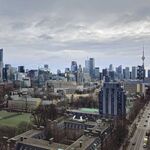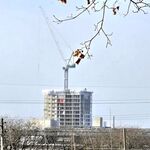Posted on June 8, 2020
Members Motion for Toronto City Council: Submitted By Councillor Josh Matlow, Seconded by Councillor Kristyn Wong-Tam
We watched the video of George Floyd being murdered by a Minneapolis police officer with horror, sadness and anger. We watched the video of Amy Cooper in New York weaponizing white privilege by calling the police on a Black person who was birding in Central Park
. We’ve seen citizens peacefully protesting police brutality met with grievous and indefensible displays of police brutality in cities across America.
These disturbing and unacceptable exhibits of police misconduct and systemic anti-Black racism have rightly captured our attention, but it is critical that we recognize that they are not new, isolated, or confined to the United States.
Black, Indigenous and People of Color too often have lower incomes, poorer health outcomes and are disproportionately represented in the criminal justice system. That’s because Black, Indigenous and People of Color face systemic racism here in Toronto every single day. That’s because systemic racism in the Toronto Police Service has deep impacts on Black, Indigenous and People of Color. That’s because systemic racism in the City of Toronto’s budget, and society at large, has deep impacts on Black, Indigenous and People of Color.
We recognize that many of the impediments to community safety will not be solved by the police. Too many people are unable to access the life-saving resources they need to thrive, while growing affordability, mental health and addictions crises are having massive health and safety impacts.
In 2016, in response to growing pressure from community members and activists, the Province of Ontario established the Anti-Racism Directorate. The Directorate is tasked with applying an anti-racism lens to government policies, programs, and services. Shortly after the formation of the Directorate, Toronto City Council called on the province to conduct a full review of the mandate, procedures and outcomes of the Special Investigations Unit with respect to the treatment of cases that involve Black, Indigenous and racialized individuals.
Since then, Premier Doug Ford has demoted the position of Minister Responsible for Anti-Racism to associate Minister, cut the budget of the Anti-Racism Directorate and eliminated the four sub-committee working groups.
If we are committed to eradicating anti-Black racism, this commitment needs to be demonstrated across the Province and funding for anti-racism work must be restored and expanded. The province must also commit to a full review of the mandate, procedures and outcomes of the Special Investigations Unit.
In 2013, we listened to the experts, including Dr. Alvin Curling, who wrote the provincial Roots of Youth Violence Report. The report, and many other studies, have concluded that police enforcement is less effective than community supports at curbing violent crime. Experts cite inequality, poverty, mental health, systemic racism, and a lack of opportunity as primary factors influencing the path a teen chooses in life.
Toronto City Council has already started to recognize the importance of community investments through the Toronto Youth Equity Strategy and the Toronto Poverty Reduction Strategy. However, there is much more work needed to provide equity for marginalized Torontonians.
Despite advocacy from organizations representing racialized Torontonians and other vulnerable communities, many of the recommendations in the strategies have not been funded or acted upon.
The path forward to supporting Black, and Indigenous and racialized communities has been made clear by those voices: defund the police and reallocate those funds toward community supports. Defunding does not mean a lack of support for the police services we rely on – it’s about a necessary rebalancing to ensure that we fund alternatives to policing.
There are actual barriers to this way forward at the municipal level in Toronto, unlike cities in other jurisdictions. Under Ontario provincial statute, Toronto City Council does not have any direct control of the police budget. While City Councillors have the ability to set the overall police budget, we cannot legally decide how the money is spent. The Toronto Police Service, for example, could unilaterally cut road safety enforcement or community and neighbourhood policing initiatives if their budget is reduced.
This motion seeks to wrest control of the police budget through an amendment in the provincial Police Services Act. As the principal funding body, we assert that Toronto City Council should have much greater oversight of how local tax dollars are spent and an understanding of the funded services.
It is incumbent upon decision-makers to ensure that necessary resources and supports are provided to Black, Indigenous and People of Color. The police budget is the single largest item in our City’s operating budget.
Therefore, this motion seeks to reduce the police budget by 10% and direct the savings towards community investments at the recommendations of the Confronting Anti-Black Racism Unit and Social Development, Finance, and Administration Division
If approved, the actions contained in this motion would be a significant step towards providing equity for Black, Indigenous and People of Color.
Recommendations:
1. City Council request the Province of Ontario to amend the Police Services Act, 1990 to allow for the City of Toronto to have direct oversight over the Toronto Police Services Budget by creating a clause in sec 39(4) that removes the word “not” as it pertains to the City of Toronto as follows:
In establishing an overall budget for the board, the Toronto City council does not have the authority to approve or disapprove specific items in the estimates.
2. City Council request the Toronto Police Services Board to provide a 2021 budget request that is 10% lower than the 2020 approved budget.
3. City Council request the Toronto Police Services Board to provide a line-by-line accounting of their 2021 budget request.
4. City Council direct the City Manager to consult with the People and Equity Division, Social Development, Finance, and Administration, the Confronting Anti-Black Racism Unit and the Anti-Black Racism Partnership and Accountability Circle and to report to the Budget Committee in Q4 2020 on recommended investments that enhance resiliency in marginalized communities, to be provided with the savings that would be realized by reallocating the funds from the 10% reduction in the Toronto Police Services budget as described in recommendation 2, potentially including:
- Community-led alternatives to policing and the criminal justice system
- Anti-racism education
- Programs identified in the Toronto Youth Equity Strategy
- Childcare
- Affordable housing
- Tenants’ Defence Fund
- Skills training and Employment counselling
- Food security
en.wikipedia.org




